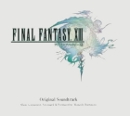
|
|
Gradius III :: Review by Chris
 |
Album Title: | Gradius III |
| Record Label: | King Records | |
| Catalog No.: | KICA-1001 | |
| Release Date: | February 21, 1990 | |
| Purchase: | Buy at eBay |
Overview
Gradius III is often regarded as the pinnacle of the classic series musically and otherwise. Led by returnee Miki Higashino, its score was filled with charming old-school melodies and creative stage themes. Gradius II's Motoaki Furukawa wasn't involved with this score because he had transferred from Konami's sound design room to their CD production section. Nevertheless, he received the opportunity to take a large role in the game's self-titled album release. Like Space Odyssey Gradius II Gofer no Yabou, the album featured an arranged and original section. This time the arrangements were performed by the Konami Kukeiha Club, the newly formed jazz fusion band, and a drama track was also integrated. The original version took an audacious route through using medleys rather than single tracks and even integrating some sound effects. The score might be legendary, but does the album do it justice?
Body
The unforgettable chord progression of "In the Wind" provides a great way to start the arranged section and leads into a passionate rendition of the main melody on Motoaki Furukawa's handmade Schecter. "Hit and Away" begins with renditions of the air battle themes before moving into a soothing rendition of the aquatic stage theme with surreal sound effects and an eventual exuberant guitar solo. While the jazz fusion leanings aren't entirely consistent with Miki Higashino's aspirations, they provide a fresh and enjoyable take on the game's music. "Legend" synchronises a bolero rhythm with a warm saxophone rendition of the title theme and then moves into a simple sentimental piano melody of the ending theme. Despite the cheese factor, the orchestral passage and second saxophone solo are beautiful in the second half is beautiful and the coda is triumphant. "Seeing New Year's in the Midsummer Dawn" is a ten minute Japanese dramatisation of the story from the game that uses music sparingly.
The original sound version comprises seven tracks each containing several themes from the game separated by pauses. It made sense to group the melodic yet cinematic title theme "Prelude of Legend" with the stylistically continuous title theme "Invitation" for the "Prologue". "First Attack" is a ten minute medley of many of the early stage themes in the game. It incorporates iconic melodic tracks such as "Departure for Space" and "Sand Storm" with experiments like the fluid jazz-tinged "Aqua Illusion" and the claustrophobic "Underground". Shooting sound effects are integrated sporadically in the arrangement. While nowhere near as jarring as the original sound stories of the 1980s, they often interrupt the flow of the music and seem unnecessary when an already complete sound effects collection is available at the end of the soundtrack. Packing seven tracks into one, the medley is comprehensive yet difficult to navigate and lacks cohesion overall.
The later stage theme medleys on the soundtrack tend to have more coherency given their components emphasise intensity. "Intense Battle!" features bold and complex music for the 3D level, bombastic orchestral and choral work for the Maoi stage, and an edgy yet triumphant latter stage theme. "Distant Field" sends listeners straight into frenzy and peril with "Fire Scramble" before integrating many of the remaining themes; it almost settles listeners up to the fright of more random sound effects. "Last Base..." integrates minimal arrangements of the series' three normal boss themes before returning to the jovial and melodious roots of the score for the final stage theme "Mechanical Boss". An essentially complete score, there is a miscellany of action and ending themes in "Dark Force ~ And to Myth" to round off the selection. Peculiarly, there is also an enhanced selection of several Gradius and Salamander tunes in "Transcend Time".
Summary
Along with Kukeiha Club, this album is probably the most important for popularising Motoaki Furukawa's jazz fusion arrangements that were so distinctive to Konami's overall sound. The arrangements were a big improvement on those of Space Odyssey Gradius II Gofer no Yabou showing that nobody understands Konami music better than their in-house musicians. The album had plenty of interesting ideas in addition to arranged tracks, such as the use of Japanese drama and original sound medleys to tell a story of a space epic. The implementation of the ideas was handled very well, but the decisions themselves were not necessarily good ones. Most significantly, the original sound version is inconvenient to navigate, not entirely synchronised with the game, and hindered by occasional sound effects. This album is good for those looking for the origins of the Konami sound or some fine arrangements, but the Gradius Arcade Soundtrack is a far better purchase for the original music, possibly the greatest Gradius score created.

